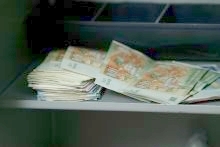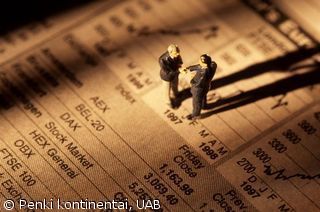Real interest rates mean great returns on the Hungarian forint
Published:
14 April 2004 y., Wednesday
Around the globe, people are looking at Hungary’s real interest rates. With consumer prices up 6.6% year-on-year in January and short-term interest rates close to 12%, there is no other emerging market that offers a better real return on your money.
Massive capital inflows confirm that there is indeed an opportunity. Hot money has pushed up the Hungarian forint to less than Ft 250 per euro. This was the level at which the forint was traded before a flow of adverse macroeconomic data and confused central bank statements drove the currency to its bottom level of over Ft 270 per euro during the second half of 2003.
Is it still worthwhile changing your humble savings into Hungarian forints to benefit from these high interest rates? The answer depends on the exchange rate at which you will convert your money back into your home currency at the end of the day.
Let us suppose you have Ђ100,000 to invest. You can invest it in T-bills from EU countries, giving you a return of around 2%. Alternatively, you change your Ђ100,000 into forints at a rate of Ft 248 and buy Hungarian T-bills for around Ft 24.8 million. This will render you a yield to maturity just below 12%, so that at the end of the year you will own around Ft 27 million.
Provided that you can change your money back into euros at the same rate, you would increase the yield on your investment sixfold compared to investing in euro T-bills! (from 2% to 12%). The problem is that you don’t know the future exchange rate. It is possible, however, to sell the whole amount on the futures market, but only at a rate of Ft 263. Hedging would cost you as much as you would gain from the interest rate differential. Alas, no free lunch.
More interesting returns are available if you’re willing to take a bet on the Hungarian forint. If you’re confident that the forint will stay firm below Ft 263 per euro until the end of December, there is no need to hedge your forint exposure. Is there any reason to be confident about this?
There are, in my opinion, two reasons that make it unlikely that the National Bank of Hungary (MNB) will let the forint depreciate again below a level of around Ft 263 per euro. The first reason is obvious, the second reason more complex in nature.
Šaltinis:
bbj.hu
Copying, publishing, announcing any information from the News.lt portal without written permission of News.lt editorial office is prohibited.
The most popular articles
 Elinor Ostrom -- an American professor who developed ways to manage common property - is the first woman to win the Nobel prize for economics.
more »
Elinor Ostrom -- an American professor who developed ways to manage common property - is the first woman to win the Nobel prize for economics.
more »
 The European Commission has today approved an application from the Netherlands under the Globalisation Adjustment Fund (EGF) for € 386 114 to help 435 workers made redundant by Heijmans N.V., a Dutch construction company, back into jobs.
more »
The European Commission has today approved an application from the Netherlands under the Globalisation Adjustment Fund (EGF) for € 386 114 to help 435 workers made redundant by Heijmans N.V., a Dutch construction company, back into jobs.
more »
 Seeking to strengthen and further expand product sales in the Asian region, the Lithuanian biotechnology company Fermentas established its subsidiary in China.
more »
Seeking to strengthen and further expand product sales in the Asian region, the Lithuanian biotechnology company Fermentas established its subsidiary in China.
more »
 Statistics Lithuania reports that, based on non-final data obtained from customs declarations and Intrastat reporting data, exports in January–August 2009 totalled LTL 25.6 billion, while imports – LTL 28.9 billion.
more »
Statistics Lithuania reports that, based on non-final data obtained from customs declarations and Intrastat reporting data, exports in January–August 2009 totalled LTL 25.6 billion, while imports – LTL 28.9 billion.
more »
 On 6 October 2009 AB Bank SNORAS Board decided to reform the Private Limited Company UAB “SNORO investicijų valdymas” into the Public Limited Company AB „Finasta Holding“, which will control recently obtained „Finasta“ group companies and other Bank SNORAS group companies, engaging in investment management.
more »
On 6 October 2009 AB Bank SNORAS Board decided to reform the Private Limited Company UAB “SNORO investicijų valdymas” into the Public Limited Company AB „Finasta Holding“, which will control recently obtained „Finasta“ group companies and other Bank SNORAS group companies, engaging in investment management.
more »
 If your airline goes bankrupt and leaves you stranded what are your legal rights? Members of the Parliament's Transport Committee want grounded passengers to have access to a special compensation fund.
more »
If your airline goes bankrupt and leaves you stranded what are your legal rights? Members of the Parliament's Transport Committee want grounded passengers to have access to a special compensation fund.
more »
 Euro report says currency provided protection from interest and exchange rate turbulence.
more »
Euro report says currency provided protection from interest and exchange rate turbulence.
more »
 Statistics Lithuania informs that in September 2009, against August, prices for total industrial production sold dropped by 1.6 per cent.
more »
Statistics Lithuania informs that in September 2009, against August, prices for total industrial production sold dropped by 1.6 per cent.
more »
 The European Bank for Development and Reconstruction (EBRD), the European Investment Bank (EIB) Group, and the World Bank Group* on Monday warned against complacency in the face of significant challenges that stand in the way of economic recovery in Central and Eastern Europe.
more »
The European Bank for Development and Reconstruction (EBRD), the European Investment Bank (EIB) Group, and the World Bank Group* on Monday warned against complacency in the face of significant challenges that stand in the way of economic recovery in Central and Eastern Europe.
more »
 The leader of the country’s investment products’ market – AB DnB NORD Bankas – intends to issue up to EUR 300 million nominal value corporate notes in local and foreign markets over the next 12 months.
more »
The leader of the country’s investment products’ market – AB DnB NORD Bankas – intends to issue up to EUR 300 million nominal value corporate notes in local and foreign markets over the next 12 months.
more »